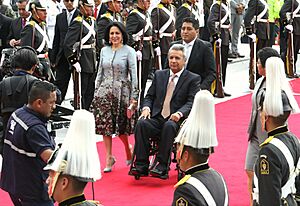Lenín Moreno facts for kids
Quick facts for kids
Lenín Moreno
|
|
|---|---|
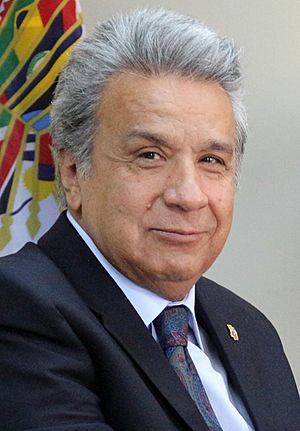
Moreno in 2018
|
|
| 46th President of Ecuador | |
| In office 24 May 2017 – 24 May 2021 |
|
| Vice President | Jorge Glas María Vicuña Otto Sonnenholzner María Alejandra Muñoz |
| Preceded by | Rafael Correa |
| Succeeded by | Guillermo Lasso |
| 47th Vice President of Ecuador | |
| In office 15 January 2007 – 24 May 2013 |
|
| President | Rafael Correa |
| Preceded by | Alejandro Serrano |
| Succeeded by | Jorge Glas |
| Acting President of Ecuador | |
| In office 15 January 2013 – 14 February 2013 |
|
| Preceded by | Rafael Correa |
| Succeeded by | Rafael Correa |
| President of the PAIS Alliance | |
| In office 1 May 2017 – 3 March 2021 |
|
| Preceded by | Rafael Correa |
| Succeeded by | Patricio Barriga |
| United Nations Special Envoy on Disability and Accessibility |
|
| In office 19 December 2013 – 30 September 2016 |
|
| Secretary General | Ban Ki-moon |
| Preceded by | Position established |
| Succeeded by | María Soledad Cisternas |
| Personal details | |
| Born |
Lenín Boltaire Moreno Garcés
19 March 1953 Nuevo Rocafuerte, Ecuador |
| Political party | Independent (2021–present) |
| Other political affiliations |
PAIS Alliance (2006–2021) |
| Spouse |
Rocío González
(m. 1974) |
| Children | 3 |
| Alma mater | Central University of Ecuador |
| Signature |  |
Lenín Boltaire Moreno Garcés (born 19 March 1953) is a politician from Ecuador who was the country's 46th president from 2017 to 2021. Before that, he served as vice president from 2007 to 2013 under President Rafael Correa.
He was chosen as the presidential candidate for the PAIS Alliance political party in 2017. After a close election, he won. However, once he became president, he changed his political direction. He moved away from the policies of the former president, Correa. By the time he left office, his public approval was very low.
In 1998, Moreno was shot during a robbery and has used a wheelchair ever since. He became a strong supporter for the rights of people with disabilities. For this work, he was nominated for the 2012 Nobel Peace Prize. When he was president, he was the only world leader who used a wheelchair.
Contents
Early Life and Education
Lenín Moreno was born in Nuevo Rocafuerte, a small town in the Ecuadorian Amazon. His father was a teacher who supported education for all children. His parents named him after famous thinkers they admired, like Vladimir Lenin and Voltaire.
When he was three, his family moved to Quito, the capital of Ecuador. He studied at several schools there, including the Central University of Ecuador. He earned a degree in Public Administration and was named the best graduate in his class.
Career Before Politics
Moreno started his career in 1976, working for different companies in management and marketing. He later took a job in the government, working for the tourism industry. He helped start the Chamber of Tourism of Pichincha and led national tourism groups.
Before becoming vice president, Moreno also wrote several books about the importance of humor and having a positive attitude.
In 2013, the United Nations named him a Special Envoy on Disability and Accessibility. In this role, he worked to promote the rights and inclusion of people with disabilities around the world.
Vice Presidency (2007–2013)
As vice president, Moreno worked to improve the lives of people with disabilities in Ecuador. He increased the budget for services that helped them with housing and income. He also started the Manuela Espejo Solidarity Mission. This program sent doctors to people's homes to provide free medical care.
Moreno was the first vice president in Ecuador to complete his full term in over 20 years. He left the office on 24 May 2013. Because of his work, he was nominated for the 2012 Nobel Peace Prize.
Presidency (2017–2021)
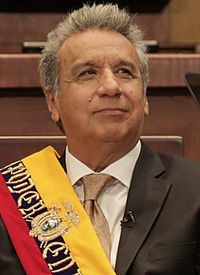 |
|
| 24 May 2017 – 24 May 2021 | |
| Jorge Glas (2017–2018) María Vicuña (2018) Otto Sonnenholzner (2018–2020) María Alejandra Muñoz (2020–2021) |
|
| Election | 2017 |
|---|---|
| Seat | Carondelet Palace |
|
← Rafael Correa • Guillermo Lasso →
|
|
In 2016, Moreno was chosen to run for president. In the election on 19 February 2017, he received the most votes but not enough to win right away. A second round of voting was held on 2 April 2017, where he defeated Guillermo Lasso with 51.16% of the vote.
Changes in Policy
Soon after becoming president, Moreno began to change the government's direction. He moved away from the policies of his predecessor, Rafael Correa. His government adopted policies that focused on reducing public spending and encouraging trade.
In February 2019, Moreno announced that Ecuador would receive a large loan from the International Monetary Fund (IMF) and the World Bank. These were organizations that the previous government had avoided working with.
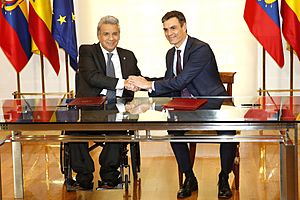
Protests and Challenges
In October 2019, Moreno's government ended subsidies that kept fuel prices low. This decision led to large protests across the country. The government had to move from the capital city of Quito to Guayaquil. After days of demonstrations, Moreno's government restored the fuel subsidies to end the protests.
COVID-19 Pandemic
When the COVID-19 pandemic began in 2020, Moreno's government declared a health emergency. They put measures in place like home isolation, online school, and remote work to slow the virus.
However, Ecuador's healthcare system struggled to handle the crisis. Years of reduced spending on public health made it difficult to respond. The city of Guayaquil was hit especially hard. The health system was overwhelmed, and it was difficult to manage the high number of deaths.
Security Issues
During Moreno's presidency, Ecuador faced growing security problems. The country saw a rise in crime. There were also major challenges with safety inside the country's prisons. Experts said that budget cuts and changes in government security departments made the problems worse.
Foreign Relations
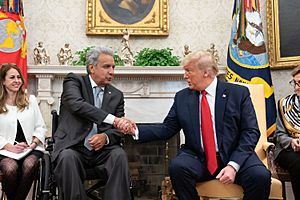
Moreno's government worked to build stronger relationships with the United States. In 2018, Ecuador left ALBA, a group of Latin American countries led by Venezuela and Cuba. In 2019, Moreno's government supported Venezuelan opposition leader Juan Guaidó.
On 11 April 2019, Moreno's government ended the political asylum of WikiLeaks founder Julian Assange. Assange had been living in the Ecuadorian embassy in London since 2012. After Ecuador's decision, British police were able to enter the embassy and arrest him.
Approval Rating
When Moreno was elected in 2017, he was very popular, with an approval rating of 77%. However, his popularity dropped over time. By the end of his presidency in 2021, his approval rating was only 9%, one of the lowest in Ecuador's recent history.
After the Presidency
Moreno did not run for re-election in 2021. After leaving office, he moved to the United States and later to Paraguay. In Paraguay, he works as a commissioner for the Organization of American States (OAS).
After his presidency, Moreno and his family faced investigations related to financial dealings during his time in office. One major case, known as the "Ina Papers," looked into an offshore company and the purchase of property. These investigations have continued for several years.
See also
 In Spanish: Lenín Moreno para niños
In Spanish: Lenín Moreno para niños


